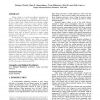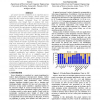119 search results - page 9 / 24 » Static Energy Reduction Techniques for Microprocessor Caches |
MICRO
2009
IEEE
14 years 2 months ago
2009
IEEE
Voltage scaling is one of the most effective mechanisms to reduce microprocessor power consumption. However, the increased severity of manufacturing-induced parameter variations a...
RTSS
2005
IEEE
14 years 1 months ago
2005
IEEE
Energy reduction is critical to increase the mobility and to extend the mission period in the development of today’s pervasive computing systems. On the other hand, however, ene...
IPCCC
2006
IEEE
14 years 1 months ago
2006
IEEE
Low power has been considered as an important issue in instruction cache (I-cache) designs. Several studies have shown that the I-cache can be tuned to reduce power. These techniq...
ISLPED
2010
ACM
13 years 7 months ago
2010
ACM
Estimation of static and dynamic energy of caches is critical for high-performance low-power designs. Commercial CAD tools performing energy estimation statically are not aware of...
ICCAD
2003
IEEE
14 years 4 months ago
2003
IEEE
On-chip L1 and L2 caches represent a sizeable fraction of the total power consumption of microprocessors. In deep sub-micron technology, the subthreshold leakage power is becoming...


